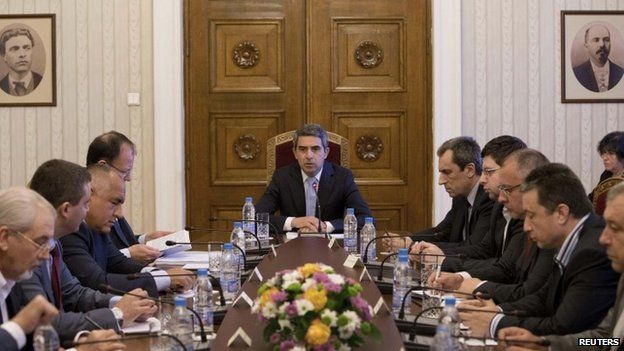 President Plevneliev (centre) said he would name a caretaker cabinet in AugustBulgaria's president has said he will dissolve parliament and appoint an interim government, amid concerns over the country's banking system, bbc reports.
President Plevneliev (centre) said he would name a caretaker cabinet in AugustBulgaria's president has said he will dissolve parliament and appoint an interim government, amid concerns over the country's banking system, bbc reports.
Rosen Plevneliev's comments came after crisis talks with leaders of the main political parties.
Earlier, five people were arrested on suspicion of plotting to destabilise Bulgaria's banks.
They are suspected of spreading false information, prompting runs on two of the country's biggest banks.
'Money is secure'
On Sunday, President Plevneliev confirmed that the current parliament would be dissolved on 6 August, paving the way for early elections on 5 October.
He also said he would name a caretaker cabinet in August.
The country's Socialist-led minority government of Prime Minister Plamen Oresharski has been in power for barely a year, and the main parties had already agreed to hold early elections.
And referring to the concerns about the banking sector, President Plevneliev said: "The money of the citizens and the firms invested in the banking institutions in Bulgaria is secure and guaranteed. The banks will continue working in a normal manner."
Bulgaria's central bank earlier said there had been a systematic attempt to undermine the country's banking system.
Last week, it took over Corporate Commercial Bank, Bulgaria's fourth-largest lender, following a run on deposits.
Speculation that the run could spread hit bank share prices towards the end of the week.
On Friday, depositors rushed to withdraw savings from First Investment Bank, the country third-largest lender. The bank was forced to close until Monday after depositors withdrew 800m lev (£328m) in a matter of hours.
Shares in the bank plunged 23% as a result.
In reality, commentators say the banking system is relatively safe.
"The banking system is stable... and the credit rating of the country remains high despite the current panic," said Petar Ganev of the Institute for Market Economics in Sofia.
"Bulgarian banks maintain liquidity, which is higher even than European banks."
 В Атырау -10
В Атырау -10